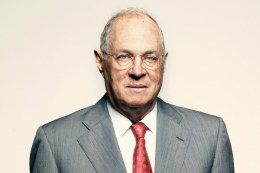
For decades the country’s top lawyers have tried to come up with a unifying theory for Justice Anthony Kennedy’s jurisprudence in hopes of winning over the closely divided Supreme Court’s key swing vote. Sometimes siding with the liberals, other times with the conservatives, Kennedy has confounded them all. “There is no grand unified theory for Justice Kennedy’s jurisprudence,” says Viet Dinh, the founding partner of Bancroft LLC, whose star, Paul Clement, argued the case against Obamacare in March. With a decision expected in that case the last week of June, all eyes are again turning to Kennedy and how he will rule.
For this week’s cover story on Kennedy (available to subscribers here), TIME interviewed dozens of his clerks, colleagues and friends and then returned to Sacramento, where Kennedy spent an idyllic childhood, and to which he moved back after law school. There we found that Kennedy and his jurisprudence are best understood as the product of the uniquely middle American world of mid-century Sacramento. Says his friend the writer Joan Didion, who was a frequent visitor to the Kennedy home in the ‘40s and ‘50s when she was a close friend of Kennedy’s older sister Nancy: “I don’t think he’s ever wanted to leave Sacramento in any real way. He wants that world in Sacramento whether it exists anymore or not.”
(MORE: Why Obamacare May Stand: Reading Justice Kennedy, the Supreme Court’s Swing Vote)
Kennedy moved into his childhood home in the Land Park neighborhood on the day Pearl Harbor was attacked, but was sheltered from the war and the other uncertainties of the era thanks to a close family and the stability of his environment. His father was a lawyer and lobbyist. Kennedy himself became a lobbyist when he took over his father’s firm in the early 60s. Kennedy became a law professor at the McGeorge School of Law during that period, thanks to the charismatic Democratic power broker, Gordon Schaber. They became good friends, and Kennedy would later learn Schaber was gay.
The piece also looks at Kennedy’s decision-making and the debates he conducts in his chambers. Alex Kozinski, the chief judge of the Ninth Circuit Court of Appeals, and Kennedy’s first law clerk, says the justice tried opinions on like hats, “Wearing it for a day, saying, ‘Well, maybe I don’t look so good in a Stetson. I think I’ll try a sombrero instead’.” We also have details of the efforts to place clerks with Kennedy in hopes of influencing him.
There’s a lot more new reporting in the piece. If you want to understand Kennedy before the Obamacare decision, subscribe and read it here or pick up a copy on newsstands Friday.

